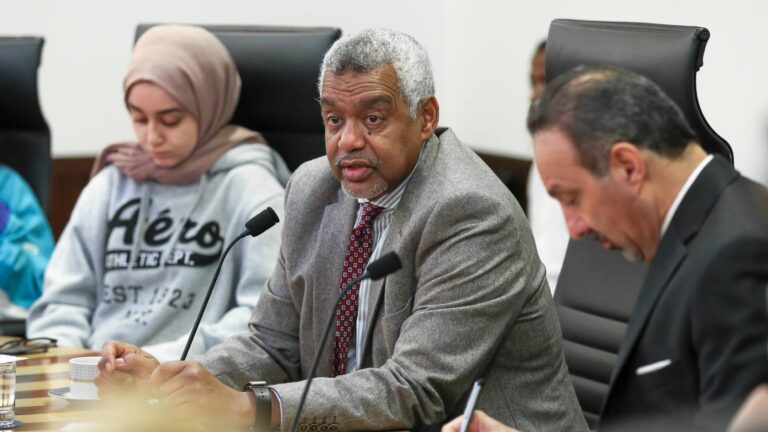Dialogue Series, Regional Studies
Prospects for a Peaceful Democratic Transition in Sudan

Abdelwahab El-Affendi, Dean of the School of Social Sciences and Humanities and Professor of Politics at the Doha Institute for Graduate Studies, was invited by CIRS to discuss the current uprisings in Sudan, with a lecture on “Prospects for a Peaceful Democratic Transition in Sudan” on February 6, 2019. Giving some background on the ongoing issue, El-Affendi explained that Omar al-Bashir has been the president of Sudan for three decades, since coming to power after a military coup in 1989. He is considered a tyrannical leader by many, and stands accused of crimes against humanity and war crimes by the International Criminal Court.
El-Affendi noted that the recent nationwide uprisings have been the most sustained in the country’s history, ongoing since December 19, 2018. “There has never been such widespread public support for a protest in the past. This protest is supported in almost every town of Sudan, among most classes of people, even among most along the spectrum—from Islamist to left wing,” which is unprecedented, he argued. Large gatherings, even wedding parties, have become sites of anti-government demonstrations. In former Sudanese revolutions, the ruling regimes fell in less than two weeks after the start of protests, largely because “the army—or sections of it—would side with the people and the regime would be forced away. This did not happen” in the current conflict, El-Affendi said. Even though the legitimacy of the government has been decreasing over the years, the military remains in support of it, and has not voiced opposition.
“There has never been such widespread public support for a protest in the past. This protest is supported in almost every town of Sudan, among most classes of people, even among most along the spectrum—from Islamist to left wing.”
El-Affendi explained that the current nationwide uprising was sparked by spontaneous anger, when “people went to their bakeries and found that bread prices had tripled one morning” in Atbara, a working-class town with a long history of labor unions—elements that contributed to the mobilization of protestors. The protests quickly spread to neighboring ad-Damar, the capital of the province, and adjacent Berber. It reached the capital city, Khartoum, within twenty-four hours. While the quick spread of the protests was surprising, it was understandable in the rapidly declining economic climate of Sudan.
Following a smaller uprising in September 2013, al-Bashir had tried to placate the public by holding so-called “national dialogues,” which gave people high hopes of serious reform, El-Affendi said. However, “the outcome of the negotiations was not up to expectations.” Essentially, nothing happened and the buildup of anger and frustration continued. In fact, El-Affendi argued, a Sudanese revolution has long been in the making, and was predicted to erupt years before the 2011 Arab uprisings, largely because of the controversial division of the country into two separate states, an excruciating loss for many in the north. “People had been predicting that this would be a trigger for an uprising because people would not accept this division of the country, and would blame the government for it,” he said.
In past Sudanese revolutions, when a regime fell, a transitional government would be set up by an alliance of political parties, trade unions and professional organizations, and there would be new elections, he said. “Now the revolutionaries are saying no.” The protestors are no longer interested in any form of consensual transition. People are so frustrated with the current regime that they are demanding that the entire structure of the government be dismantled, El-Affendi said. “The revolutionaries are very radical in their demands. They say we don’t want any negotiations with this government, we don’t want any talks with them.” As such, al-Bashir and his administration are on the defensive and mobilizing resources to reassert control. “At the moment, we are in a kind of deadlock where protests seem to be mounting and sustained, while the government seems to be able to hold the fort,” El-Affendi said.
In conclusion, El-Affendi suggested three possible solutions to the conflict: 1) the military can refuse to serve the government, similar to what happened in Tunisia and Egypt during the Arab uprisings; 2) the government can escalate the violence and start killing civilians to deter protests; 3) or a mediation effort can be implemented via the international community, through the African Union, for example. The former African Union President Thabo Mbeki had intervened in Sudan in the past, mediating situations like the conflict in Darfur in 2008, and the conflict between Sudan and South Sudan, he said. However, the Sudanese government seems to think it does not need international or outside help. Finally, El-Affendi characterized the situation as “a kind of Syrian scenario, where the regime will hold its own, but the protests will increase, and will probably become violent.”
Article by Khansa Maria, CURA Publications Fellow.
Abdelwahab El-Affendi is Dean of the School of Social Sciences and Humanities and Professor of Politics at the Doha Institute for Graduate Studies. Previously, he was Head of the Politics and International Relations program at DI, and Coordinator of the Democracy and Islam program at University of Westminster. He also worked as a diplomat in the Sudanese Foreign Ministry and has worked as Editor or Managing Editor of several publications. He was a Visiting Fellow/Professor at the Christian Michelsen Institute in Norway, Northwestern University, Oxford University, Cambridge University, and the International Institute of Islamic Thought and Civilization in Malaysia. He is the author of Genocidal Nightmares: Narratives of Insecurity and the Logic of Mass Atrocities (2015).